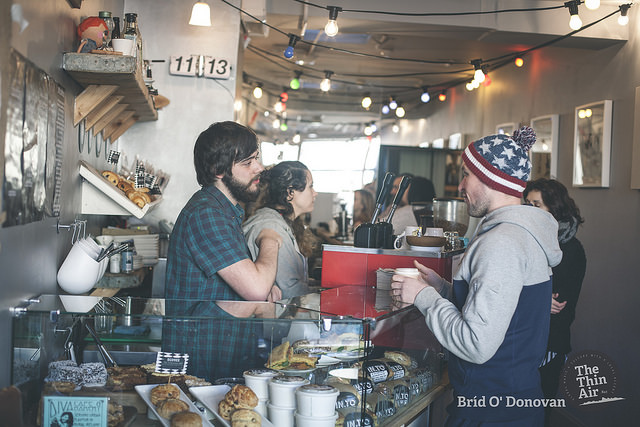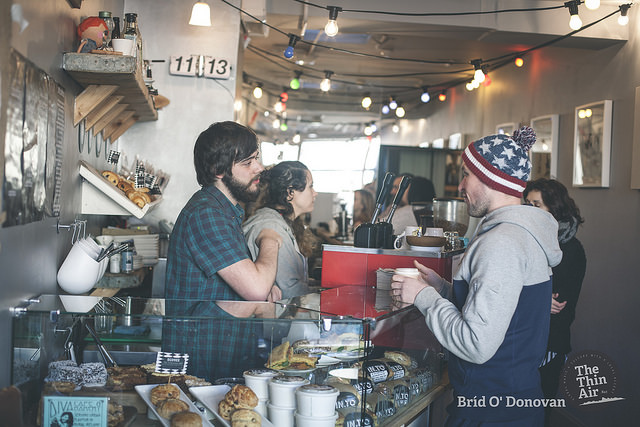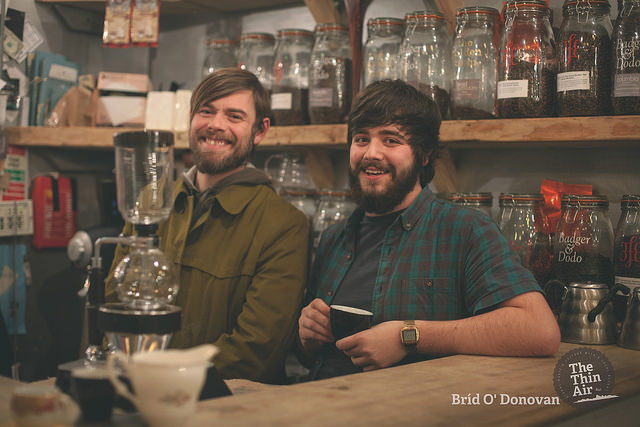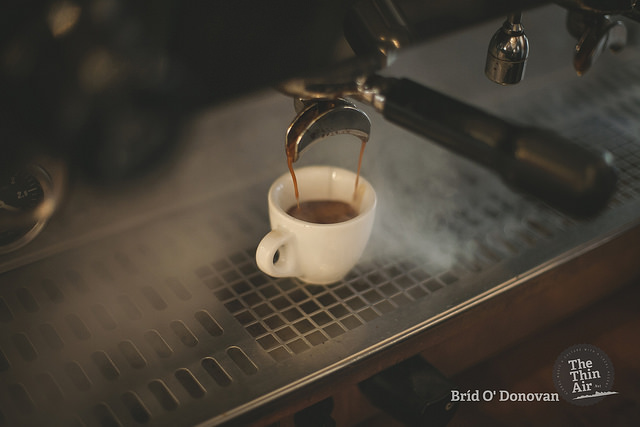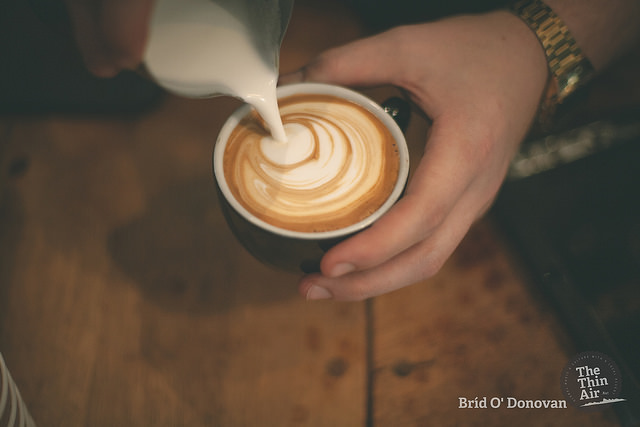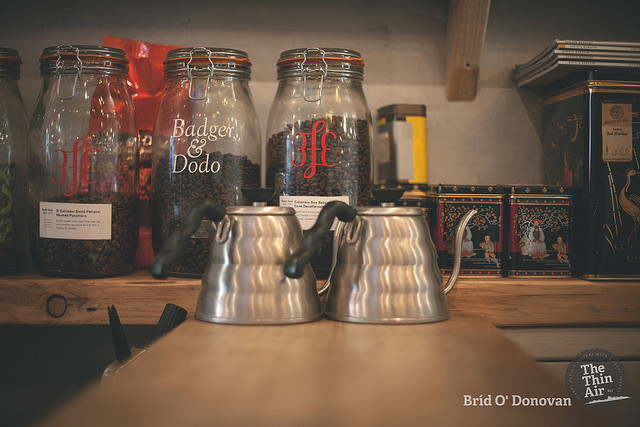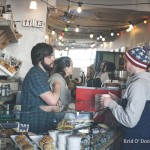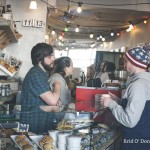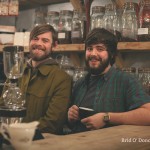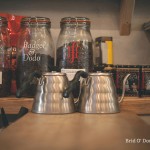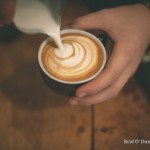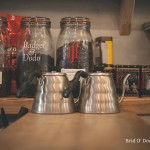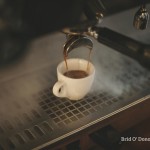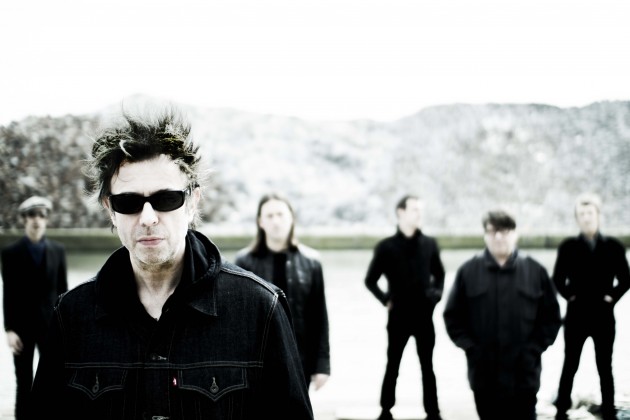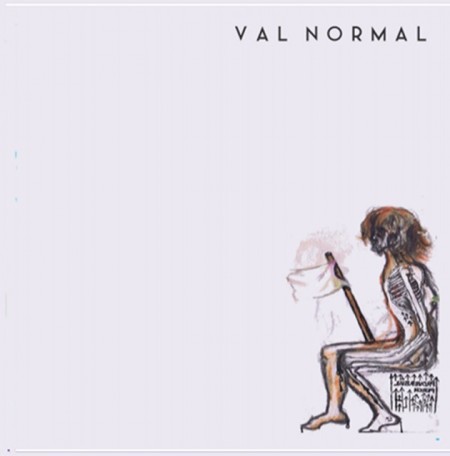F I L T E R espresso and brew bar in Cork city has quickly become the go to spot for coffee lovers in Cork city. They are situated on Georges Quay and promote a relaxed and cheerful atmosphere with banging tunes and regular exhibitions promoting local creatives. In the latest installment of her column Cork Heads, photographer Brid O’Donovan captures an average day in F I L T E R and chats to owner Eoin MacCarthy and barista Alex Bruce.
Can you blindly tell what kind of coffee you’re drinking?
Alex: Maybe not the specific region but maybe the area where it’s from. An Ethiopian or a Rwandan would be very bright and acidic. A Brazilian or an Indonesian would be dark and chocolatey. You can figure it out that way. If you had three coffees in front of you, you could definitely pick them out. If you had two from a similar region and one from a different region you could pick the odd one out.
Eoin: It depends on the setting as well. If we’re sitting down with a new coffee, we will try it, read the notes, look at it. People need coffee so I need coffee. I really need coffee! (laughs) So I’ll wake up and have some and not think about it too much sometimes. Other times I’m tasting instead of just consuming.
Alex: In the beginning of F I L T E R it was hard because people were a little taken aback by the menu. It was kind of hard for them to grasp. It was something different that people hadn’t experienced here before.
Eoin: We’re open two years since December. For the first birthday I printed the number 365 on postcards and I got them to print them over at the Community Print Shop. They did our vouchers for us as well. So we got them to print them up and we gave them to people to mark the occasion and get a free coffee back.
What brought you to open F I L T E R?
Eoin: It’s funny because we have the same coffee background. I would have started my coffee career in Gloria Jeans on Patrick street the day it opened, the same day I got my Leaving Cert results. It was my first job out of school. 1996. So I stayed there for three or four years but went away travelling and learned lots of coffee tricks in Australia. Gloria Jeans was speciality in Cork. It opened my eyes to speciality coffees. They had different beans from the different regions. Some expensive Jamaican Blue Mountain coffee, the Sumatran coffee which is much darker and they had the blends. It was very 90s, American style, second wave kind of stuff which had four sizes of coffee, the frappe style cold drinks, everything. So that’s where Alex first worked in Cork, so did Steve who works here as well, along with Paul Budds who is the head barista at The Golden Bean and who we work closely with. So they all started there. We all learned a lot in Gloria Jeans and we would have met like minded people and then I went on to somewhere more sociable that suited us. After I came back from Australia I went on to work in Cafe Gusto.
Was there a change in people’s attitude to coffee between leaving for Australia and coming back?
Eoin: Yes, definitely. A complete change. But there was a gradual change from 1996 to 2001/2002. I was happy out just hanging out and having fun. I had finished school. But it still had a big impact on me and made me want to stay in this industry. I did other things too. I ran Cafe Bar Deli (where Coqbull is now) for five years to try full on service with hoards of people – 350 people in four hours kind of a thing. I was there from when it opened in 2005 until 2010 and then I went on to Gulpd in the Triskel Arts Centre. I opened Gulpd with Jimmy and the lads and then came here and did this. It was a natural progression but my heart went back to the short service, hanging out, chatting with people in an easier going kind of way, you know? Gulpd opened on Record Store Day 2011. That was amazing. I was brilliant to be able to go into a space where loads of other things were happening but doing it with the lads who have great taste, great taste in music. Then I thought “Hey, I can do this myself”. Alex was working down in Gusto at the time and he’d pop in the whole time.
Alex: We’d meet in the alley way and talk about coffee “Have you seen this new machine?” “Have you seen the way this coffee is roasted?” That sort of thing.
Eoin: Coffee chats. I’ve known Mark from The Golden Bean for a long time. His coffee was always great but he was just getting to know his coffee then. The Guatemalan La Perla would have been the first coffee that we started serving in Gulpd which we ran for 8-12 months. We were just serving that one coffee and getting used to that coffee. We were getting to know everything about that coffee and then we got to be obsessed by it, completely obsessed by it. Gulpd became known as the place for coffee and with Alex coming up from Gusto and talking about the latest new trickery and machines.
Alex: We are the stage now where it’s at the wine stage – you’re appreciating it a lot more. Rather than just going out and getting drunk on wine, you’re actually tasting wine. To get something from coffee you really have to actually taste the coffee in that sense.
Supporting Local
Eoin: I think there’s been a big focus here in Cork. With the markets becoming a go-to for everybody.
Alex: I think it should be a normal thing. Back in the day, everything was local. It wasn’t a ‘thing’, it was something that was normal. We are so far past that, that it’s trendy now.
Eoin: What’s different now is that you have a lot of people going one way and a lot of people going the other way. There has been a lot of focus on local here in Cork. Local producers have gotten quite famous from doing what they do and being leaders in our tiny little country which is still a hard thing to do. There are an awful lot of producers in this town who are definitely could be put up on the world stage for what they do because of quality. I think because of recession, there’s been more of a focus on quality and focusing on your local quality. That’s the first thing you want to do when shit hits the fan – support local. The local producers that we support are The Golden Bean, Badger and Dodo, 3fe from Dublin and our organic milk is from McCarthy’s farm in Macroom.
Alex: Our cakes are from Diva in Ballinspittle.
Eoin: And all our baked goods from our subsidiary, sister company In To Food. We’ve taken on doing all our own baking and sandwiches. That’s an interest that came from working in the restaurant and being around food for a long time. It’s knowing what’s good for our custom and what our customers like which is that local, freshly prepared, daily prepared thing. We make our own breads and everything that’s in them is all market fresh and as local as we can possibly get it. We are looking at using Woodside farms which is free range pork. Pigs in this country are treated really badly as well as chickens. Don’t eat it if it’s not free range. Our beef is champion, it’s the best in the world, it’s all grass fed. There’s an awful lot of things that as a country we do really well but then there’s a lot of things that you just think “Oh that’s just what we do.” Until I opened my eyes to it I thought well, why wouldn’t it be okay to eat it? You don’t know until you’re told sometimes. We’re going to start growing and rearing. We’ve some land and we’re going to get more into organic and chemical free produce. You pick up a bag of rocket and you don’t even look at where it is from. I used to live in a share house for years and a friend of mine worked in refugee law. She’d always come back to me and go “Where did you buy those herbs? It says fucking Israel on it. Don’t buy them there!”. Until someone tells you those little things you really don’t know. Our customers are great. They are really conscious of what they are buying and where they are buying it from. It’s easy for us now, having the experience we have, being the people behind the counter doing what we do. People trust what we are buying in.
Alex: The roasteries themselves are buying in directories versus Fairtrade or Rainforest Alliance. They give farmers a fair price for their coffees. Directories go and give the farmers more money than what these big companies are giving them and in turn they want a higher quality product. So they’ll give them more money for their crops and they expect a top notch product. It motivates them to work harder and there’s more quality control over their coffee. The direct trade route is right next to speciality coffee.
Eoin: They are producing a sought after and well produced coffee. There’s people like Colin Harmon (3fe) and Steve Leighton (Has Bean) who are world leaders at this stage of the direct trade route. They expect if they are going to be paying that much money for their pound of coffee then they are putting their money back into permaculture and community welfare. Families live on these farms to support communities basically. They are so poor and the product that’s coming out of it, it’s like, it’s a completely different world. From where this coffee starts, from where it’s from, you see India, Guatemala and Ethiopia – some of the poorest countries in the world. There’s a high grade, hugely sought after coffee coming from there where you can guarantee that they are just getting by but hopefully the roaster is buying from the broker or directly trading through the broker to get enough money to support their community to make this coffee come back year after year after year. We get a lot of coffees in, especially the last few years now.
Alex: So you might have one plant but different variations on it. Like a Pinot Grigio or a Malbec, there’s a different variety of bean. You could have the same farm, the same region but different varieties and different processes. So you have a wet process, a dry process where the beans are washed and soaked or some are patio dried and turned.
Eoin: So it depends on what they are set up for but it’s all basically done. If they can afford it they will have milling machines and enough people to pick from the plant because the plant is so complex itself, depending on the varietal and the weather. The cherry ripens at different stages, it doesn’t ripen all together at the same time. It wouldn’t be like a grape where it all happens at the same time. The speciality places need to hand pick. They need people to trail the fields and pick the red cherries. It’s insane.
Alex: Lower quality coffee would all be picked at once and mismatched. That’s why you get such distinct flavours because people are picking the ripest cherries for like two weeks.
Eoin: Brazil would have the biggest yield of Arabica which is what it all is. All the coffee is Arabica.
Alex: When you go below a certain sea level it’s called Robusta and that’s high caffeine content and less flavour. Arabica is more flavour less caffeine. Back in the day a lot of espressos were Robusta because they wanted the kick, not the flavour. It’s a much easier coffee to grow.
Eoin: It’s less susceptible to pesticides and all that.
Alex: It’s a lot cheaper to buy so a lot of people would put 20/30% in their blends to give it a kick.
Eoin: Arabica in it’s natural flavour is more floral, complex, juicy blueberries and stuff like that. Robusta is like rubber! That’s down to their roaster where they would try to compensate for a bad flavour and over roast it. All of our coffees are Arabica, fully speciality and pretty complex. There’s a lot of information there. That’s why I think the focus has been taken on by a lot of people. You have the person who wants to buy their bag of coffee for home and they would play with the coffee. When they are brewing their coffee, if they had a couple of degrees hotter on the kettle to a couple of degrees more in their cafetiere you’ll get a little different flavour. You can play around with it. There’s a right and a wrong and a grey area. It’s up to the person that’s brewing it to decide what they want. We do stick to guidelines of how to brew a coffee here. There’s lots going on! There is constant innovation out there too. The people that are buying the coffee try and give back to the communities but also to try and get their farmers to try different methods and try different plants. You’d have hundreds of plants germinated to start growing but it takes a couple of years for them to get to full maturity before they can actually be harvested. It’s huge but you’d never think about it in your daily cup. You trust us to give you the best coffee but there’s that other end of it that’s hugely important to the business that we are building. We’ll never grow coffee here but if I could get to Guatemala on maybe the Christmas party 2025 that would be great! (laughs) Because there is such a focus on speciality we need to focus on what’s outside of that in our everyday. We don’t bombard our customers with our ethics or our new system or anything like that. That’s a very heavy conversation when someone just wants a coffee. We are very easy going here, we have a great laugh and we enjoy what we do as well.
Alex: There’s this whole stigma with pretentious/hipster coffee places.
Eoin: We do have beards…
Alex: But it’s not like that at all here. Places can be quite pretentious about it.
Eoin: People in bigger cities can be a bit forceful on the whole “No, we don’t serve soya milk”. We are on the same stretch of the city as The Quay Co-op and what was Very Healthy Food on Douglas street. But soya milk doesn’t taste great with coffee. My buzz word when someone orders it is “You know it’s disgusting right?”. Just to have a laugh over it. If you want it you want it.
Alex: I’d recommend that you try it first without milk to taste all the work and effort that has gone into it to make that cup taste how it does before you put milk or sugar in it. But you’re paying for it and you can do whatever you like with it. I’d just suggest to try the coffee first. I won’t give you a dirty look, well maybe a little one (laughs).
Designing F I L T E R
Eoin: It’s all upcycled furniture. We got loads of free scaffolding boards so we used those for our behind the counter shelving. We sanded that down and the back counter which was black. That was a table and we spend about an hour and a half belt sanding that down. The front counter is a table chopped up with painted doors as panelling the whole way along. We cut out panels and put in old manor house vents and old street grates and there’s one at the end of the counter which was an old drain. All locally sourced from Linehans. They buy bulk at auction so I went out to him and asked for a few doors and this and that. There was stuff that we had collected as well. We designed the place three or four times when we were setting it up. We knew we had a challenge because it was so small. Fifteen people max. We looked at our materials and adapted them to work for us. We had the coolest carpenter in the world. We were bringing him bits of doors everyday. Ontwerpduo are these Scandinavian designers and they have this thing called Light Forest with copper piping. We designed the lighting based on that. Their lamps are flush and are like the top of a trumpet. We looked into getting trumpets in bulk. I had three at home that I had found in charity shops. They were totally battered and we were going to use those tops and hang them up but we could only find three and buying them in bulk from Japan or China was completely out of the question. We found the ones we have between B&Q and every other dodgy light shop in this one horse town. I swear to god I never want to see another building providers ever again! There’s such a bulk of the same kind of things when you go to these places. You have to think outside the box. You have to pick up pieces and think “Ok. That could be that.” Just finding raw materials, getting them for free or really cheaply. Our vision was massive but it only came together bit by bit because of what we had. It was mad to do it.
What’s next?
Eoin: Keeping F I L T E R, F I L T E R. It’s a place for everybody and it’s all about enjoying it really. We are still going to work with people and have exhibitions here. We love doing that.

